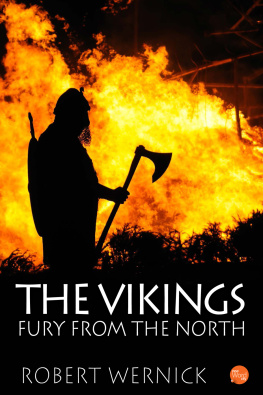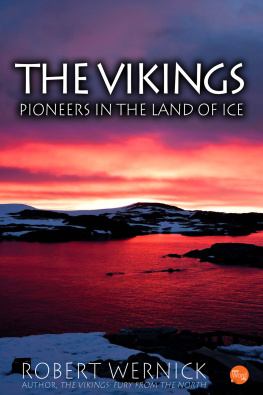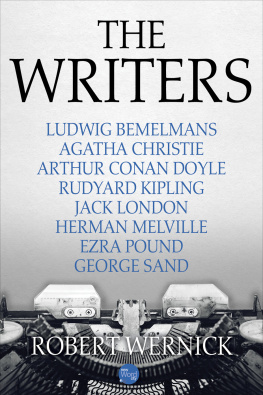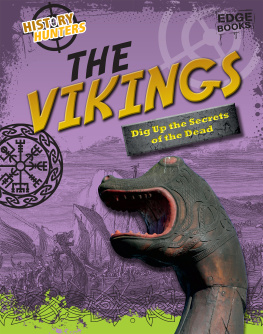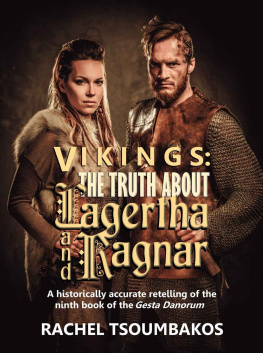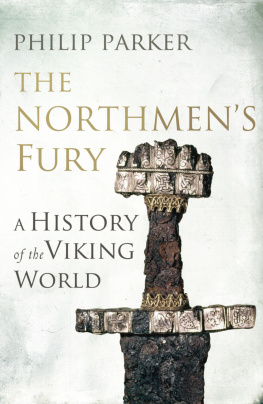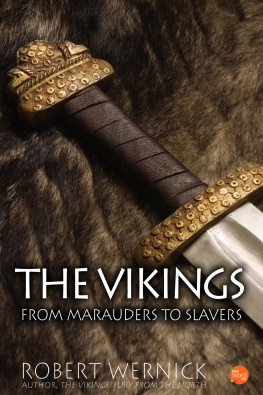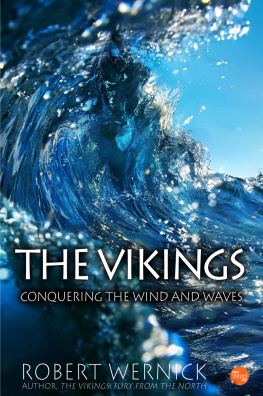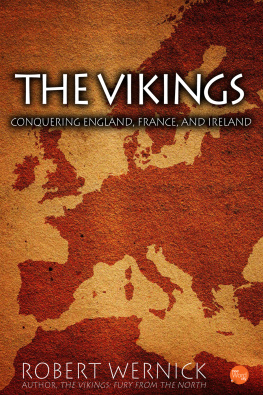Robert Wernick - The Vikings: Fury From the North
Here you can read online Robert Wernick - The Vikings: Fury From the North full text of the book (entire story) in english for free. Download pdf and epub, get meaning, cover and reviews about this ebook. year: 2013, publisher: New Word City, genre: Non-fiction. Description of the work, (preface) as well as reviews are available. Best literature library LitArk.com created for fans of good reading and offers a wide selection of genres:
Romance novel
Science fiction
Adventure
Detective
Science
History
Home and family
Prose
Art
Politics
Computer
Non-fiction
Religion
Business
Children
Humor
Choose a favorite category and find really read worthwhile books. Enjoy immersion in the world of imagination, feel the emotions of the characters or learn something new for yourself, make an fascinating discovery.
- Book:The Vikings: Fury From the North
- Author:
- Publisher:New Word City
- Genre:
- Year:2013
- Rating:3 / 5
- Favourites:Add to favourites
- Your mark:
- 60
- 1
- 2
- 3
- 4
- 5
The Vikings: Fury From the North: summary, description and annotation
We offer to read an annotation, description, summary or preface (depends on what the author of the book "The Vikings: Fury From the North" wrote himself). If you haven't found the necessary information about the book — write in the comments, we will try to find it.
Much about the Vikings remains a mystery - including the very name by which they are known. Whatever its origin, the word Viking quickly acquired a meaning it has never lost: a seaborne rover, raider, and conqueror. Yet, the Vikings had another side that was exceptionally creative and constructive. And in the long run, this was far more influential than all the fire and fury of their raids. Here, in this short-form book, is their story.
The Vikings: Fury From the North — read online for free the complete book (whole text) full work
Below is the text of the book, divided by pages. System saving the place of the last page read, allows you to conveniently read the book "The Vikings: Fury From the North" online for free, without having to search again every time where you left off. Put a bookmark, and you can go to the page where you finished reading at any time.
Font size:
Interval:
Bookmark:
They came out of the cold and hostile north on a June day in 793 A.D. - long, low, black ships with large, curving prows and broad, red-and-white sails, dancing over the waves toward the English tidal island of Lindisfarne off the coast of the medieval kingdom of Northumbria. The ships plunged right onto the beach, and out poured a band of mighty, tangled-haired men, howling like animals and waving their long, broad swords. They charged up the islands grassy slopes, where sheep and cattle grazed.
Lindisfarne had much to attract the invaders. On the island stood a venerable Christian monastery to which generations of sinners had bequeathed riches for the salvation of their souls. In its chapels and on its altars lay a bounty of gold crucifixes, linen and silk tapestries, and books encrusted with jewels.
To the monks who lived amongst these treasures, the monastery was more than a repository of worldly wealth. It was a center of learning, a sanctuary for contemplation. The monks spent their days praying, chanting, inscribing manuscripts, corresponding with fellow monks throughout the Christian world, and chronicling the events of their times. They had no weapons to defend themselves, and they could not believe that anyone on the island would try to harm them.
The monks were no match for the intruders from the sea. These men had no reverence for the Christian God, no scruples about plundering a Christian sanctuary, and no regard for human life other than their own. They cut down some of the brothers in front of their altars. Others were thrown into the sea to drown, and still others were stripped naked and driven out of the monastery to hoots and jeers. The sacred buildings were looted - their gold and silver, illuminated manuscripts, and precious stones carried down to the beach, where the invaders loaded the treasures onto their waiting ships. Long before an alarm could be sent out, the vessels, now laden with plunder, vanished over the dark waters of the North Sea from whence they came.
This was an atrocity unprecedented in the memory of people of the time, and the shocking news flew as fast as messengers on foot, horse, and ship could carry it throughout the scattered Anglo-Saxon kingdoms in the south and east of Britain and beyond. Before long, knowledge of the event had crossed the English Channel to the land of the Franks on the Rhine. There another Anglo-Saxon monk and ranking scholar of the age, Alcuin, was supervising a revival of learning at the court of the Emperor Charlemagne at Aachen. Expressing his alarm, Alcuin wrote, It is nearly 350 years that we and our fathers have inhabited in this most lovely land, and never before has such a terror appeared in Britain as this that we have just suffered from a pagan race. To Alcuin and his contemporaries, the desecration of the monastery was not only appalling but remarkable - remarkable that at a time when sailors would not venture out of sight of land such an inroad from the sea could be made.
Alcuin could not have imagined the terrors yet to emerge out of the sea during his lifetime and many lifetimes to come - terrors that would make Lindisfarne seem like a minor act of vandalism. The pagans to whom he referred were the Norsemen, people with whom British and European merchants already had a nodding acquaintance as traders. Soon these raiders would be known as the Vikings and viewed as a scourge to the civilized world. In the Vikings melee of death and destruction, many like Alcuin saw the fulfillment of the words of the Old Testament Prophet Jeremiah - out of the north evil shall break forth upon all the inhabitants of the land - and thought the Day of Judgment might well be at hand.
The summer after the assault on Lindisfarne, the Vikings descended upon Jarrow, about fifty miles down the Northumbrian coast, and struck a blow at the monastery that once was the residence of the Venerable Bede, perhaps the greatest historian, theologian, and astronomer of his time. In the summer of 795, the Vikings ravaged Iona, off the coast of Scotland, and Morgannwg, on the southern coast of Wales. In 797, it was the turn of the Isle of Man, and, in 800, of a monastery just south of Jarrow, and another, more distant, on the west coast of Scotland. Before long, it was said, the monastery chapels and village churches of England rang with a new prayer: A furore Normannorum liberu nos, Domine (From the fury of the Northmen deliver us, 0 Lord).
And still the Northmen came. Those sudden, hit-and-run, summertime assaults at the close of the eighth century were just the first stirrings of what was to become an epic campaign lasting nearly 300 years. From about 800 onward, the Vikings swept south, west, and east as if on a tidal wave - swelling in numbers and spilling farther and farther afield. The wild beasts, wrote the French monk Abbo, go through hills and fields, killing babies, children, young men, old men, fathers, sons, and mothers. They overthrow, they destroy, they ravage; sinister cohort, fatal phalanx, cruel host.
Sometimes the Vikings struck the same places again and again. The famous Irish monastery of Armagh - chosen by St. Patrick as the base of his church in the early fifth century - was to be plundered five times - three of them in one month in 832. The port of Dorestad, on the Rhine, the biggest commercial center of northern Europe, was robbed, wasted, and depopulated at least six times. No one knew where the Vikings would strike or when or in what numbers. Hamburg was sacked. Paris was burned. As fear and foreboding enveloped Europe, it seemed, wrote one monk, that all Christian people would perish.
The Irish author of a dire twelfth-century book entitled The War of the Irish With the Foreigners spoke for all Europe when he cried out from the depths of anger and anguish: Although there were a hundred hard, steeled, iron heads on one neck and a hundred sharp, ready, cool, never-rusting, brazen tongues in each head and a hundred garrulous, loud, unceasing voices from each tongue, they could not recount, or narrate, or enumerate, or tell what all the Irish suffered in common, both men and women, laity and clergy, old and young, noble and ignoble, of hardship and of injury and of oppression in every house, from these valiant, wrathful, purely pagan people.
Such was the picture of the Vikings drawn by monks. Yet, Vikings had another side. It was one that worried monks could not see or recognize - a hugely productive and creative side. And in the long run, this aspect was far more consequential than all the fire and fury of their raids and incursions.
The Norsemen may have begun as raiders, but they developed into skilled conquerors and competent administrators. They established long-lived states at the ends of Europe - east, west, and south. They taught the wild Slavic people of what is now Russia the rudiments of civil government. The Duchy of Normandy in northern France was a Viking creation that, by the standards of the time, was a model state with a more tightly centralized government than anything the West had seen since the overthrow of Rome centuries before.
The Vikings were capable tradesmen as well, canny, enterprising, risk-taking merchants, always on the lookout for new routes of commerce to open or old ones to revive. They brought fresh goods and fresh ideas to the West and played a pivotal role in spawning the new class of feudal lords that would arise in the Middle Ages.
Although they came from an almost entirely rural society with no more than a few towns in all their land, they became town builders when the occasion demanded. Plundering the primitive agricultural kingdoms of Ireland, they found it advantageous to create a series of market towns all around the coasts that became cities and, for the first time, provided the Irish with the inspiration and challenge of urban life.
The Vikings were foot-loose, adventurous, and brave as lions, all qualities that made them desirable mercenary soldiers for foreign rulers. When the ruler himself was brave and generous, they fought for him to the death. Vikings formed the personal bodyguard of the Roman emperors of Byzantium and helped their doomed but dazzling realm to survive for another half millennium.
Next pageFont size:
Interval:
Bookmark:
Similar books «The Vikings: Fury From the North»
Look at similar books to The Vikings: Fury From the North. We have selected literature similar in name and meaning in the hope of providing readers with more options to find new, interesting, not yet read works.
Discussion, reviews of the book The Vikings: Fury From the North and just readers' own opinions. Leave your comments, write what you think about the work, its meaning or the main characters. Specify what exactly you liked and what you didn't like, and why you think so.

